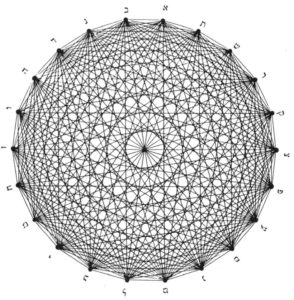On the festival of Shavuot it is customary to stay up all night learning Torah and showing our devotion to God’s Word. Previously, we traced the origins of this custom to the Kabbalists of Tzfat in the 16th century, based on the teachings of the Zohar that date back to Rabbi Shimon bar Yochai in the 2nd century CE. However, there is actually one more historical mention for a tikkun leil Shavuot, of sorts, that predates Tzfat, the Zohar, and even Rashbi. The first-century Jewish sage and philosopher, Philo of Alexandria (c. 20 BCE – 50 CE), describes a ritual where certain Jews would stay up all night on Shavuot:
And after the feast they celebrate the sacred festival during the whole night; and this nocturnal festival is celebrated in the following manner: they all stand up together, and in the middle of the entertainment two choruses are formed at first, the one of men and the other of women, and for each chorus there is a leader and chief selected, who is the most honourable and most excellent of the band. Then they sing hymns which have been composed in honour of God in many metres and tunes, at one time all singing together, and at another moving their hands and dancing in corresponding harmony and, uttering in an inspired manner, songs of thanksgiving…
The ideas were beautiful, the expressions beautiful, and the chorus-singers were beautiful; and the end of ideas, and expressions, and chorus-singers was piety; therefore, being intoxicated all night till the morning with this beautiful intoxication, without feeling their heads heavy or closing their eyes for sleep, but being even more awake than when they came to the feast, as to their eyes and their whole bodies, and standing there till morning, when they saw the sun rising they raised their hands to heaven, imploring tranquillity and truth, and acuteness of understanding. (On the Contemplative Life, XI, 83-89)
Philo calls this sect of Jews the Essenes, or the Therapeutae, the “Healers”. They have become more well-known in recent decades because of their association with the Dead Sea Scrolls. Who were the Essenes? What did they believe? Why did they stay up all night on Shavuot? And how did they come to influence Kabbalah and other mystical movements? Continue reading →

